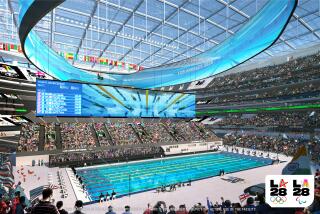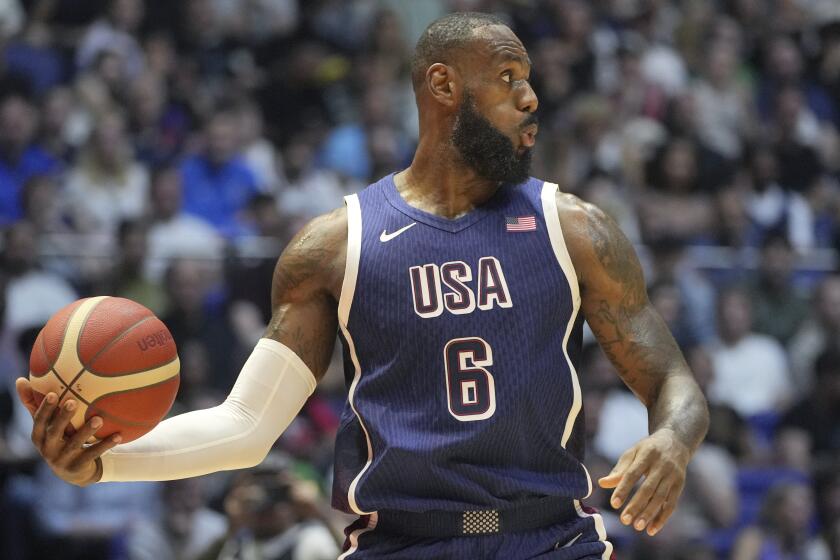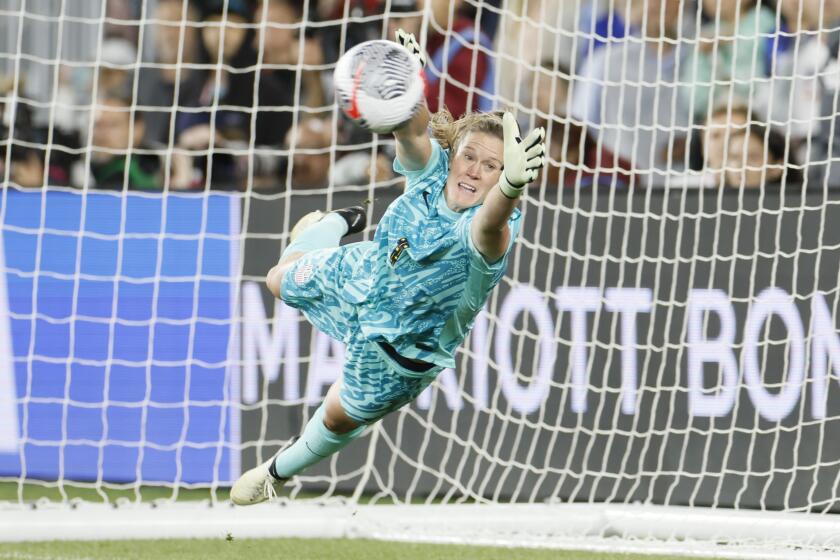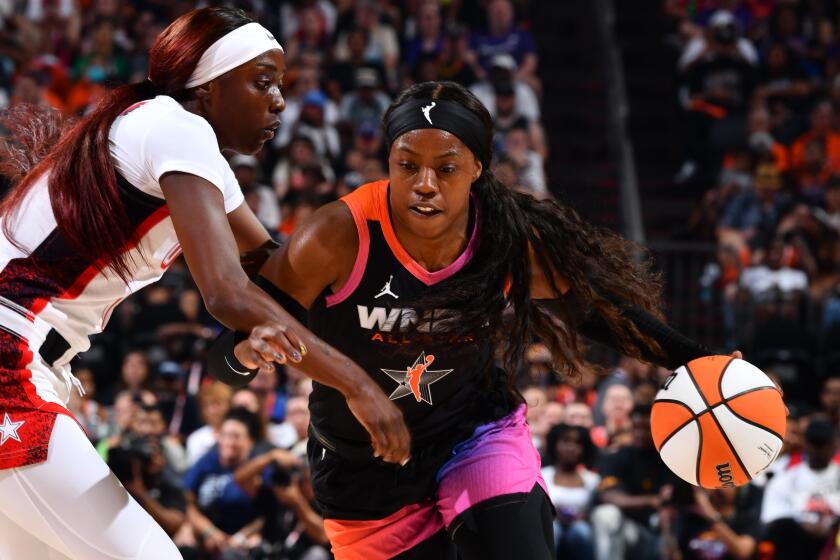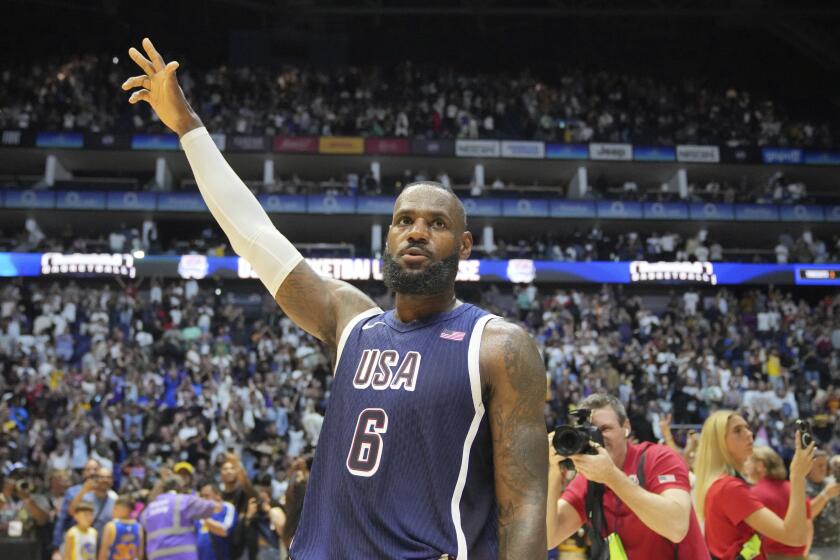A Wave From Yugoslavia : Water polo: Sasa Poljak had trouble learning the language in the classroom when he arrived at Pepperdine, but he’s at home in the water as one of the top scorers on the nationally ranked team.
When Pepperdine water polo star Sasa Poljak first came to the school’s Malibu campus from his native Yugoslavia, he knew hardly a word of English.
He arrived on an athletic scholarship in June, 1985, and was to attend his first classes the following September. Realizing that he had to learn English as quickly as possible, Poljak (pronounced POLE-yak) buttonholed everybody he met and tried out phrases he had picked up from television and books.
“I’m sure I was extremely annoying, but I would speak to anybody and say, ‘Don’t hesitate to correct me any time, or I won’t get through my classes.’ ”
Poljak’s method of learning by being a pain in the neck apparently worked. In his first term, he passed his classes and told himself, “There’s no way they can fail me now.”
Pepperdine opponents may have wished that Poljak’s conversation partners had told him to go jump in the lake and that he had understood and followed orders. He has been a pain in the neck to other water polo teams since he first started playing for Pepperdine.
In his first three years, the 6-foot, 6-inch fifth-year senior scored 243 goals, including 83 each in 1986 and 1987, when he helped the Waves gain NCAA tournament berths. He was chosen an All-American in 1987, was twice selected to All-Big West Conference teams and was named the conference co-player of the year (with Greg Wilson of UC Irvine) in 1987.
He would have played his senior season in 1988, but Pepperdine Coach Terry Schroeder, who spent the first five weeks of last season as captain of the silver-medalist U. S. Olympic team, asked Poljak and Rafael Gandarillas of Puerto Rico to redshirt last year.
Schroeder’s theory was that Poljak and Gandarillas, another high-scoring fifth-year senior, would have been wasted by playing on last year’s squad, which was filled with inexperienced players. The theory was borne out when the 1988 Waves, coached by assistant David Myers for the early part of the season, finished 8-17 overall, 3-7 in the Big West Conference, and failed to land an NCAA berth.
But Schroeder, who led the U.S. national team to its second straight silver medal in the 1988 Olympics, was confident that Poljak and Gandarillas could be a big help to this year’s Waves, buoyed by the return of redshirt sophomore Geoffrey Clark, who played for Australia’s 1988 Olympic team.
Schroeder said that Poljak and Gandarillas “knew (last year) that they were going to have to take a few extra classes to graduate and that (their) redshirting would let the younger guys develop and (the team would have) a chance to do a little bit better this year.”
That may have been the understatement of the year in college water polo. Pepperdine, ranked third nationally, is 20-4 overall, 6-0 in the Big West, and seems assured of going to the NCAA championships on Nov. 24 and 25 in Indianapolis.
Schroeder’s absentees from last year are all doing very well. Clark has scored a team-high 71 goals, followed by Poljak with 60 and Gandarillas with 40.
But the Pepperdine coach knew he would get a lot of scoring from that trio. He wasn’t sure about something else: “At the beginning of the year, my biggest concern was that I didn’t think we had the ability to play defense.”
It soon became apparent that he needn’t have been concerned. The Waves have been scoring an average of 12.63 goals a game while holding opponents to 7.75 goals a game.
The low scoring of other teams, Schroeder said, is a direct result of “good defense and a good goalie. Wells Guthrie has been coming on strong for us in the cage.” Guthrie, a sophomore from Newport Harbor High School, has 192 saves and a goals-against average of 6.81.
You might think that Poljak, 24, would have resisted staying at Pepperdine another season, particularly since Clark and he play the same position, the two-meter or hole man, and that Clark has taken over the scoring leadership from the Yugoslav. You’d be wrong.
“I didn’t mind staying,” Poljak said. “I was excited because I knew that Clark was coming back, and Gandarillas would also be back. We wouldn’t have helped last year’s team as much as this one--and there was no way we would have won” the conference last year.
“I’ve also had a year more to decide what I’m going to do with my life.”
Poljak said he has not resented Clark for taking away the scoring spotlight. “I’m happy to give it to the younger generation,” he said. “Clark is a world-class player and has a great mind and attitude toward the game. I’ve never seen anyone with the physical ability to play water polo that he has.” Because Clark and Poljak are both hole men, Schroeder said, he has been able to rest Poljak more than in the past and his defense and the team’s have consequently improved.
“Sasa (pronounced Sasha) has always been a very good all-around player,” Schroeder said, “but he’s been helped on defense by not having to set hole (like a basketball center in the pivot) at all times.”
Players on offense are “constantly wrestling and tend to rest a bit on defense,” Schroeder said. “Being able to rotate (Poljak and Clark), to switch those guys in and out, allows them to work harder on defense. And I think that has helped the team a great deal.”
Poljak has been a big help to Pepperdine, but there was a time when he was something of a hindrance. He may have learned English by talking, but in his early matches with Waves he sometimes used his new language to talk out of turn.
“When he first got here he was used to the European style of play,” Schroeder said. When someone on a European team is not doing well, he said, “they yell at each other to fire the rest of the guys up. We don’t do that here; we try to build each other up rather than yell at each other.”
Poljak, who must have picked up the English vernacular quickly, tried out some of the earthier phrases on his teammates. Schroeder said Poljak sometimes used to demonstrate “a bad temper. But he has learned to control his emotions and is a better player (because of that). He is the team captain this year, which has helped him mature. When you have to be a leader, it has a calming effect in the water. I think Sasa has grown a lot as a player and a person.”
Poljak may be outgrowing water polo after a long career that started when he was 11 and included years of playing for Yugoslavia’s junior national and national teams.
He said that he still enjoys the game, but that he intends to pursue bigger game with his business-communications major when he graduates. His mother, he said, wants him to settle down in his hometown of Zagreb, but he plans to return to the United States after graduation and a visit to his homeland.
He wants to become an entrepreneur in international trade, he said, dealing with Yugoslavia in the commodities market. No doubt he will be a wheeler-dealer who talks a mean game.
More to Read
Go beyond the scoreboard
Get the latest on L.A.'s teams in the daily Sports Report newsletter.
You may occasionally receive promotional content from the Los Angeles Times.

